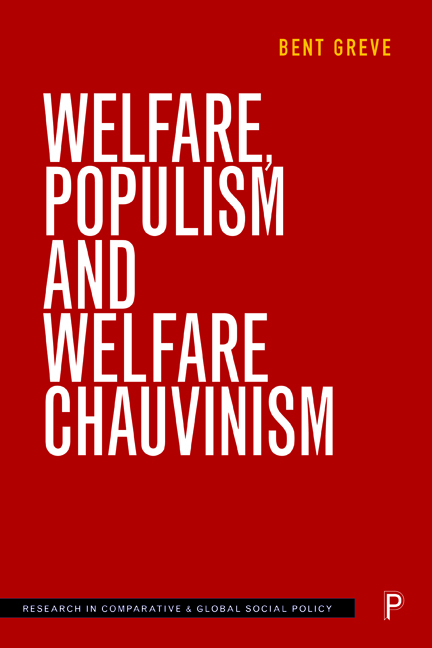Book contents
- Frontmatter
- Contents
- List of tables and figures
- Preface from the series editors
- Preface
- 1 What is it all about?
- 2 Basic concepts
- 3 Why inequality matters
- 4 Dualisation and the labour market
- 5 What form has the development in welfare spending taken?
- 6 Has social cohesion been eroded?
- 7 What do we know about citizens’ perception of the welfare state?
- 8 Populism, welfare chauvinism and hostility towards immigrants
- 9 Concluding remarks
- Index
9 - Concluding remarks
Published online by Cambridge University Press: 27 April 2022
- Frontmatter
- Contents
- List of tables and figures
- Preface from the series editors
- Preface
- 1 What is it all about?
- 2 Basic concepts
- 3 Why inequality matters
- 4 Dualisation and the labour market
- 5 What form has the development in welfare spending taken?
- 6 Has social cohesion been eroded?
- 7 What do we know about citizens’ perception of the welfare state?
- 8 Populism, welfare chauvinism and hostility towards immigrants
- 9 Concluding remarks
- Index
Summary
Introduction
This last chapter aims to sum up what can be considered central aspects and elements to be aware of if connecting populism, welfare chauvinism and developments in welfare states. First, though, in the second section, there is a discussion of whether there has been permanent austerity and/or retrenchment, including how and whether this can be seen in relation to those who are perceived as deserving compared to those seen as undeserving. In the third section, some of the most central lessons from the analysis are presented, whereas in the fourth section, the attempt is made to try to draw some policy conclusions, with reflections on how change in policies might have an impact on welfare state development. This also includes a few suggestions related to how welfare states can develop in the years to come. Lastly, in the fifth section, there is a final summary.
Retrenchment: seemingly not the only game in town?
As discussed, especially in Chapter 5, the data indicate that in many welfare states, there has not been de facto retrenchment or austerity with regard to overall levels of welfare spending since the financial crisis. This is not to say that there have not been any cuts in specific social policy areas, and, further, that it might have been felt as austerity by groups whose conditions have deteriorated due to tighter conditions for receiving, for example, welfare benefits. Even with real increases in overall spending, a higher number of people eligible for services as a consequence of demographic developments, such as in the field of elderly care, might also be experienced by individuals in need of services as austerity. Within the pension system, with a certain time lag, there might also be a relative reduction in replacement rates and increases in the eligible pension age for receiving old-age pensions, as well as the possibility that the replacement rate will be further reduced over time. Still, the data seem to indicate that within the pension field, there is still a better replacement rate for many low-income earners, although with variations across countries.
This possible, although very slow and gradual, reduction in pensions is in contrast to old people often being seen as those who deserve benefits and/or services.
- Type
- Chapter
- Information
- Welfare, Populism and Welfare Chauvinism , pp. 153 - 160Publisher: Bristol University PressPrint publication year: 2019



